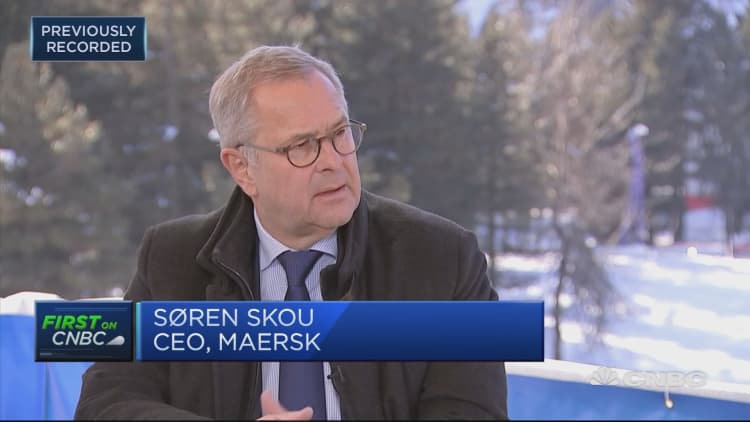
The chief executive world's largest cargo shipping company says the "phase one" trade deal is unlikely to improve flagging volumes at sea, any time soon.
After months of testy negotiations on trade, China and the United States have co-signed a preliminary trade deal that beefs up rules on intellectual property, technology transfer and obliges China to buy more American farm goods.
Speaking to CNBC at the World Economic Forum in Davos on Thursday, Maersk CEO Søren Skou, said it was "too early to say" that the phase one agreement would actually improve trade volumes.
Skou said he hoped the first segment of the trade deal would help to remove uncertainty within boardrooms around the world and, in turn, drive forward investment decisions.
The Dane added that while consumer spending is holding up quite nicely around the world, any real revival of volumes in core shipping will depend on business commitment.
"What we are looking for are things that reduce uncertainty in the world. Particularly uncertainty among business leaders, so that we can get investments back up again and get capital goods moving again. That's the important thing," he said.
Maersk plans to publish its annual report for 2019 on Thursday 20 February 2020.
Skou said although all the figures were yet to be finalized, 2019 was shaping up to be a poor year for growth within the company, estimating a less than 2% rise in cargo volume on 2018.
The chief executive noted that there had been zero growth in the fourth quarter of 2019 year-on-year, adding that while this was "quite weak" it was being compared to the last three months of 2018 when shipping had been made busier by a front-loading of business ahead of impending U.S. tariffs.
The Danish shipping firm's 2018 annual revenue was $39 billion, and it employs roughly 80,000 people around the world.
The conglomerate split and sold its oil & gas operations to Total in 2018 and Maersk Drilling has been spun off into a separate company and listed on the Nasdaq. Maersk's share price, on a downward trend since 2015, has risen more than 13% over the last 12 months.






